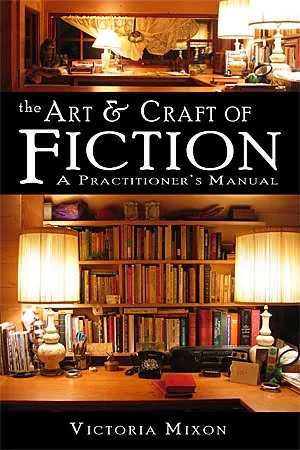
By Victoria Mixon
You're all freelancers working in nonfiction, right? You know about keeping your language simple and clean. You've all learned pyramid structure, starting with a lede of no more than 34 words, two sentences of approximately 17 words each, giving the who, what, where and when. (Sometimes you even do it that way!) Just as in fiction, that's your hook.
You use topic sentences to introduce each of your points on the how and why. Just as in fiction, that's your development. And you organize your topics in order of importance because you know your editor might very well have to slash the last two inches without warning during the witching hour of deadline. You know this. You're a grown-up.
But you still have to end your piece on something fresh and interesting in case you get to keep the entire thing and your reader actually reads it all. It can't be anything essential because it might get cut. And it can't be the least riveting point because it's the last thing your reader remembers. It has to be. . .resonant.
And this is where fiction teaches you something you need to know, because fiction is also structured for resonance. Fiction is also designed to reward the reader who makes it all the way to the end.
In fiction it's called the resolution, the epiphany following the climax. In journalism it's the kicker.
But how do you make that kicker both resonant and inessential?
Just as in fiction---you look to your hook.
Suppose you're writing a piece on Mommy bloggers who have adopted, and your lede highlights a particular moment when a particular Mommy blogger caused a particular Internet fracas over adoption with a particular post. You go on to various points about Mommy blogging and adoption along with quotes from Mommy bloggers, adoptive parents, their advocates and detractors.
Since you've presumably researched the Mommy blogger who appears in your lede, you must have lots of material on her. Some you can't fit in.
So you set aside the most fascinating point mentioned in the lede that isn't germane to your main point. (Was she unable to conceive? Or did she choose not to? Are her children of another race? Another country?) You use an illumination of that as your kicker.
But suppose you're writing about couples in Silicon Valley whose long hours and heavy responsibilities on the forefront of breaking technology interfere with their relationships. Your lede focuses on three couples who made radical changes in their careers that affected their marriages. You make a series of points about the ramifications these people's decisions have upon their personal lives, their professional lives, even their companies.
Again you've got lots of information you can't squeeze into that lede, details not important enough to make full points but interesting anyway. You scribble them on scraps of paper and lay them across your desk, arranging and rearranging.
You've got it! Someone gave you a great quote about couples in Silicon Valley who start businesses together. That's your kicker.
Or suppose you're writing about where groundbreaking medicine intersects with English as a Second Language (ESL). You have a lede on a major breakthrough by an Indian physician. You have points this physician has discussed with you in-depth---epidemic health concerns, communication with the rest of the medical world through English-language journals and the growing number of Third World professionals who earn their degrees in First World universities and bring their expertise home to the desperately needy of their own countries.
You know where this physician earned their degree. They've told you a story, an aside, about the personal cost to them of leaving their family, returning home, the culture shock of living in a global village.
Kicker.
My grandmother called it "a baker's dozen" when the baker threw an extra roll into each twelve ordered. South Americans call it the "llapa," a small piece chopped off a quality piece of red meat at the butcher's and tossed in with your pork chops.
It's that little something extra your reader doesn't expect.
But what if your kicker does get cut? Unlike novelists you have no guarantee that, even if the reader reads your entire piece, this unique, touching, unexpected climax will ever see the light of day.
Oh, that one's easy. That makes it the lede to your next article.

Victoria Mixon is the co-author of CHILDREN AND THE INTERNET: A ZEN GUIDE FOR PARENTS AND EDUCATORS, Prentice Hall, 1996, and author of THE ART & CRAFT OF FICTION: A PRACTITIONER'S MANUAL, La Favorita Press, March, 2010. She freelances as an independent editor and blogs on writing at VictoriaMixon.com, and in her online magazine, The Art & Craft of Fiction.
If you'd like to contribute a guest post to The Urban Muse, please check out the guidelines for guest bloggers